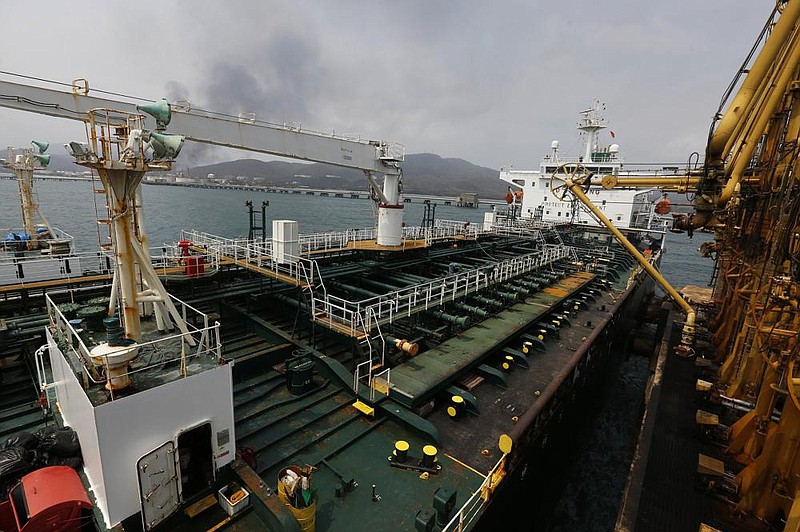The United States seized four tankers carrying Iranian gasoline bound for Venezuela.
The tankers were transporting 1.116 million barrels of petroleum, which has now been confiscated after help from "foreign partners," the Justice Department said in a statement Friday. It is not clear where the ships were at the time of the seizures because they had all turned off their satellite-tracking systems to avoid detection between May and July, according to data compiled by Bloomberg.
"These actions represent the government's largest-ever seizure of fuel shipments from Iran," according to the Justice Department statement, which said the Islamic Revolutionary Guard Corps, designated a foreign terrorist organization, was behind the shipment.
Last month, federal prosecutors in Washington filed a civil forfeiture complaint alleging that the sale was arranged by a businessman, Mahmoud Madanipour, with ties to Iran's Revolutionary Guard Corps.
The prospect of retaliatory action by Iran has the potential to disrupt oil markets if Iran interferes with international oil tankers transiting the Strait of Hormuz, the world's most critical choke point for oil shipments. However, the impact to oil prices may be limited from what it once might have been given lower fuel consumption in the face of pandemic-driven lockdowns and America's decreased dependence on foreign oil.
A senior U.S. official told The Associated Press that no military force was used in the seizures and that the ships weren't physically confiscated. Rather, U.S. officials threatened ship owners, insurers and captains with sanction to force them to hand over their cargo, which now becomes U.S. property, the official said.
Iran was exporting gasoline to fuel-starved Venezuela in defiance of U.S. sanctions that are intended to choke off both nations from oil revenue. Presently, Venezuela is unable to produce gasoline because of widespread mechanical failures at its refineries and needed the shipments to alleviate fuel rationing.
Five Iranian tankers arrived without incident in May and July, delivering about 1.5 million barrels of gasoline and stunning observers who wondered at the time if Iran would so blatantly defy U.S. sanctions efforts.
Subsequently, in July the U.S. filed a complaint seeking to forfeit the cargoes aboard four more tankers underway for the South American nation. A seizure order was granted for the M/T Bella, M/T Bering, M/T Pandi and M/T Luna. The Wall Street Journal reported that the ships are being directed toward Houston in the coming days.
The Pandi, also known as Andy, and the Luna turned off their satellite signals on July 7 near the Strait of Hormuz, according to data compiled by Bloomberg. Bering switched off its transponder on May 11 while approaching the Aegean Sea. The Bella was last seen May 11 near the Philippines.
The disclosure of the seizure adds to a broader effort by the Trump administration to turn up the heat on Iran. The United Nations Security Council is nearing a vote on a U.S. resolution to extend an international ban on arms deals with Iran, threatening to assert the right to "snap back" sanctions eased under the 2015 nuclear deal that President Donald Trump abandoned.
Trump was asked about the tankers at a news conference in Washington. "Iran's not supposed to be doing that," he said. "We seized the tankers, and we're moving them" to Houston, he said. Secretary of State Mike Pompeo tweeted that the proceeds of the confiscated cargoes could go to help U.S. victims of state-sponsored terrorism if they're forfeited by the courts.
The Trump administration views the maritime industry as the weak spot in sanctions enforcement. In May, the Treasury released an advisory on what the shipping sector should be looking for in terms of evasion techniques and potential red flags with a focus on Iran, North Korea and Syria.
Iran's ambassador to Venezuela, Hojad Soltani, pushed back on the seizures, saying Thursday on Twitter that neither the ships nor their owners were Iranian.
"This is another lie and act of psychological warfare perpetrated by the U.S. propaganda machine," Soltani said. "The terrorist #Trump cannot compensate for his humiliation and defeat by Iran using false propaganda."
Information for this article was contributed by Stephen Cunningham and Lucia Kassai of Bloomberg News; and by Joshua Goodman and Scott Smith of The Associated Press.
